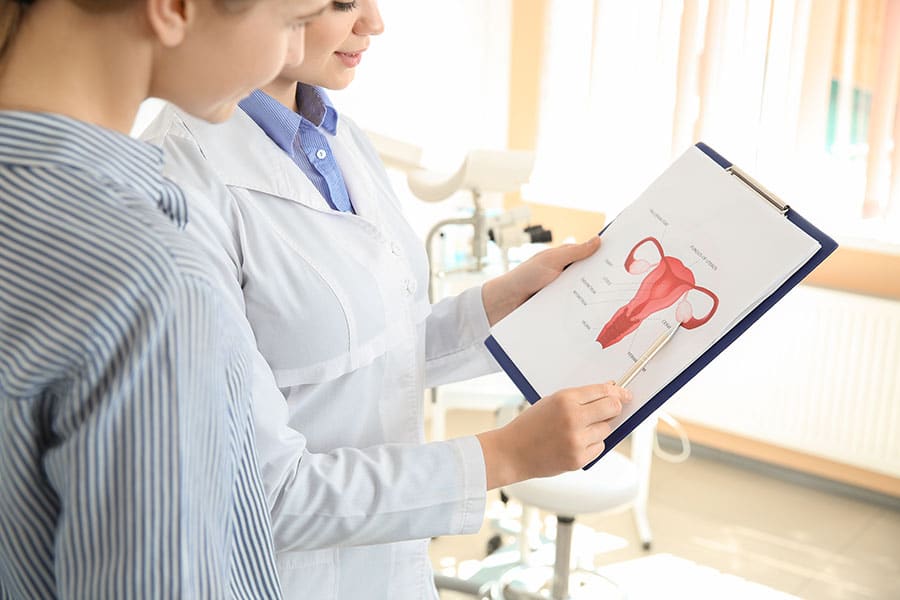Think You May Be Pregnant?
We are proud to be the first choice in gynecology and abortion services for patients in the Virginia, Maryland, Washington, D.C., and West Virginia area.
Wondering if you are pregnant can be nerve-wracking. Knowing ahead of time of what to expect with pregnancy testing can help ease some of your anxiety. Here we provide information on what you can expect for pregnancy testing at your doctor’s office. Visit our Home Pregnancy Tests page to learn about tests you can take at home.

Wondering if you are pregnant can be nerve-wracking. Knowing ahead of time of what to expect with pregnancy testing can help ease some of your anxiety. Here we provide information on what you can expect for pregnancy testing at your doctor’s office.Visit our Home Pregnancy Tests page to learn about tests you can take at home.
We are proud to be the first choice in gynecology and abortion services for patients in the Virginia, Maryland, Washington, D.C., and West Virginia area.
There are two main types of pregnancy tests that can let you know if you’re pregnant: urine tests and blood tests. One tests the blood for the pregnancy hormone, hCG. And you need to see a doctor to have a blood test. The other checks the urine for the hCG hormone.
Doctors can perform urine pregnancy tests (UPT) in their office and is usually the first step in diagnosing a pregnancy. After the urine testing, the doctor can perform even more pregnancy tests such as a blood test and sonogram.
Blood tests are done at your doctor’s office, but are used less often than urine tests. These tests can detect pregnancy earlier than a home pregnancy test, or about six to eight days after ovulation (when an egg is released from the ovary). But with these tests, it takes longer to get the results, usually 2-3 days, than with a urine pregnancy test since they must be sent to a lab. Most doctors’ offices are not certified nor setup for blood analysis.
Two types of blood pregnancy tests are available:

When should I visit the doctor for a pregnancy test?
More often, you may take a home pregnancy test (HPT) to quickly determine pregnancy. If a home pregnancy test is positive and you have decided to continue with the pregnancy, you should call an obstetrician (OB or OB/GYN) as soon as possible. The doctor can use a more sensitive test such as blood testing along with a pelvic exam to make sure you are pregnant. Seeing the doctor early in your pregnancy will help you and your baby to stay healthy.
If a home pregnancy test is positive and you have decided not to continue with the pregnancy, you should call a clinic as soon as possible. The doctor will do another urine pregnancy testing (UPT) for their records and a sonogram to determine how far your pregnancy has progressed and discuss termination options that best suit your circumstances. Click here for help in choosing a clinic.
How do urine pregnancy tests work at the doctor’s office?
All pregnancy tests, whether it is EPT, First Response, ClearBlue or at your local doctor’s office, work by detecting a particular hormone in the urine that is only there when a woman is pregnant. This hormone is called human chorionic gonadotropin (kohr-ee-ON-ihk goh-NAD-uh-TROH-puhn), or hCG, also called the pregnancy hormone.
hCG is made when a fertilized egg plants itself in the uterus. This happens approximately six days after the egg and sperm unite. But in 10% of women, implantation, when the fertilized egg attaches to the uterus, does not occur until later, after the first day of the missed period. The amount of hCG quickly builds in your body with each day you are pregnant.
The question often arises, what is the difference between a home pregnancy test done at home and a urine pregnancy test performed at a doctor’s office? The difference is not in the test itself but in the ability of the person who reads the test confidently.
What is a sonogram or ultrasound?
A sonogram or ultrasound is a test done during pregnancy that uses reflected sound waves to produce a picture of a fetus. The picture is displayed on a TV screen and may be in black and white or in color. The pictures are also called a sonogram, echogram, or scan, and they may be saved as part of your medical record. Sonogram (sono) can determine the gestational age or estimate age of the fetus. Therefore, it can give you approximately how far you are in your pregnancy; find out if you are pregnant with more than 1 fetus and the gestational age or estimate age of the fetus.
Transvaginal (in the vagina) sonogram is generally done early in a pregnancy to determine fetal age or to detect a suspected ectopic pregnancy.
How is a transvaginal sonogram (vaginal sono) performed?
For a vaginal sono, you do not need a full bladder. The vaginal transducer, which resembles a thick wand, is usually covered with a latex sleeve or condom and a vaginal lubricant, such as K-Y Jelly. If you are allergic to latex, tell the health professional before having the test. You will lie on your back with your hips slightly raised. The transducer will be inserted gently into your vagina, and then it will be moved and rotated to adjust the view displayed on the monitor. There is normally no discomfort involved with a vaginal sono. You may feel a light pressure when the transducer is moved in your vagina. And there are no known risks associated with a vaginal sono, either to the mother or fetus.
What is an ectopic pregnancy?
Pregnancy begins with a fertilized egg. Under normal conditions, the fertilized egg attaches itself to the lining of the uterus. With an ectopic or tubal pregnancy, the fertilized egg implants itself in one of the two fallopian tubes, which attach themselves between the ovaries and uterus. The fallopian tubes normally carry the eggs from the ovaries to the uterus. Rarely, an ectopic pregnancy occurs in the abdomen, ovary or neck of the uterus (cervix).
An ectopic pregnancy cannot grow normally. The fertilized egg can’t survive, and the growing tissue may destroy various structures, such as in a tubal pregnancy. When a fertilized egg attaches itself to a fallopian tube; the egg grows and eventually bursts the fallopian tube causing hemorrhaging (internal bleeding) and left untreated, the severe blood loss can lead to death. Early treatment of an ectopic pregnancy can help preserve a woman’s life and the chance for future healthy pregnancies.
A woman with an ectopic pregnancy may not have any indication of being pregnant. Early signs and symptoms, if they happen, may be the same as any pregnancy, a missed period, breast tenderness, nausea, vomiting and fatigue. If you think you are pregnant and take a test, it will be positive.
But an ectopic pregnancy can’t continue as a normal pregnancy. The first warning signs of an ectopic pregnancy often include:
If the fallopian tube ruptures, symptoms may include:
Contact a doctor if you have:
Call 911 if you experience any signs or symptoms of a rupturing ectopic pregnancy, including:
An ectopic pregnancy can happen to anyone and usually occurs when the fallopian tube is scarred, damaged or misshapen. Sometimes, the specific cause of an ectopic pregnancy is a mystery. The best way to diagnose an ectopic pregnancy is to see a doctor as soon as you suspect you are pregnant and follow treatment.

2616 Sherwood Hall Ln. Suite 307 Alexandria, VA 22306-3154
Alexandria Women’s Health Clinic is an abortion clinic offering abortion services including abortion pills and abortions. We service the following areas Alexandria, Richmond, Arlington, Centreville, Dale City, Reston, Harrisonburg, Leesburg, Mclean, Charlottesville, Tuckahoe, Ashburn, Manassas, Lake Ridge, Burke, Annandale, Mechanicsville, Linton Hall, Oakton, Oak Hill, Springfield, West Falls Church, Fredericksburg, Winchester, Sterling, Short Pump, Herndon, Fairfax, South Riding, Baileys Crossroads, Chantilly, Lincolnia, West Springfield, Culpeper, Tysons Corner, Montclair, Lorton, Meadowbrook, Franconia, Idylwood, Laurel, Bon Air, Vienna, Buckhall, Sudley, Wolf Trap, Fort Hunt, Cherry Hill, Hyblalley, Highland Springs, Great Falls, Merrifield, Front Royal, Bull Run, East Highland Park, Glen Allen, Groveton, Falls Church, Kings Park West, Brandermill, Newington, Mount Vernon, Broadlands, Fairfax Station, Dranesville, Lakeside, Sugarland Run, Gainesville, Huntington, Lowes Island, Warrenton, Countryside, Lake Monticello, Brambleton, Wyndham, Rosslyn, Lake Barcroft, Seven Corners, Purcellville, Bristow, Dunn Loring, Woodburn, Floris, Triangle, Greenbriar, New Baltimore, West Gate, Montrose, Dumbarton, Hollymead, Ashland, Sandston, Yorkshire, Independent Hill, North Springfield, Strasburg, Mantua, Fort Belvoir, Laurel Hill and surrounding areas.
Website & SEO By: Partners For Choice